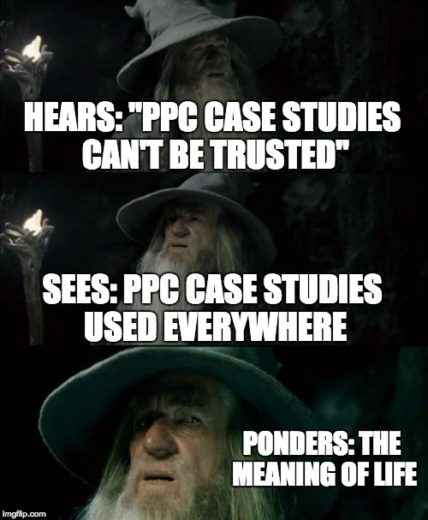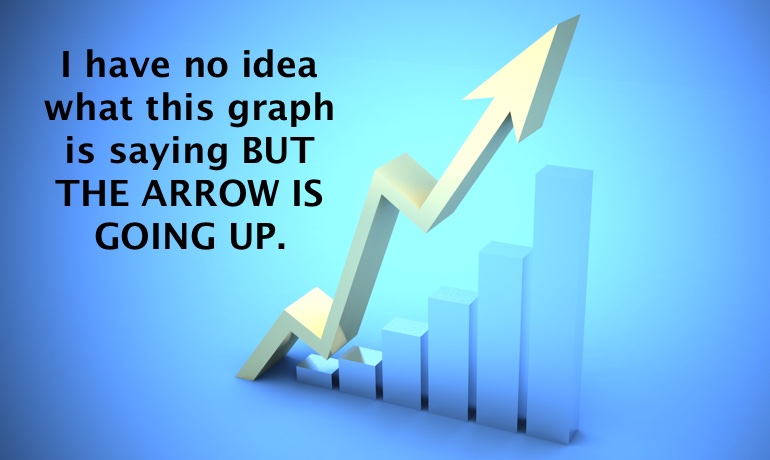I feel like I should #micdrop after that title. If this were a live conference, I imagine the room exploding in argument. We PPCers like our case studies. But upon closer examination, is the case study really the best option? I’d like to demonstrate in this blog post why I believe it is not.
The case study is a beloved device used by sales people everywhere for, well, touting how great they are. I mean, let’s be honest, that’s what it is. I’m not saying it’s wrong, I’m saying a case study is used in PPC for the express purpose of proving the awesomeness of the presenting company. With that definition, one would be foolish to ignore the biased nature of the case study.
Matt Umbro and I have bantered back and forth on this since Hero Conf. Matt takes the logical position that there are times the case study is needed to present the steps for replicating a specific activity to get a desired outcome. I prefer to throw the baby out with the bathwater in this case. I’m just really sick of case studies. I don’t trust them, and frankly, if you read through the last PPCChat on case studies, you will notice that no one else seems to trust them either (someone even started a hashtag called: #brutallyhonestcasestudies).

So why does the case study hang around? Frankly, from what I can tell, the answer has always been simple pragmatism:
“It works.”
Clients see these positive metrics going up (positive emotional reaction!) and those pesky metrics like cost going down (negative emotional reaction!). The prospect says, “Wow, they can do that for me too? Where do I sign!”
The problem is when Toto eventually pulls back the curtain.
In this instance, Toto is the pesky client who wonders where all those unkept promises are that they saw in that brilliantly crafted case study.
The Curtain Of PPC Selling
There are two key aspects of case studies that create this curtain.
First, it is (basically) impossible to create an unbiased case study. The case study will ALWAYS be composed of cherry-picked data. Why did you include this graph and not that one? Well, frankly, because it looks better, that other pesky graph allows the client to wonder whether there is more to the 2,000% increase in revenue than simply turning on that one PPC campaign.
Second, because no case study can be perfectly unbiased, it cannot inherently set correct expectations. This is the rub. A business relationship established upon incorrect expectations can quickly devolve from a joyful relationship into an unimpressed first date.
It’s Like Dating Expectations
Allow me to illustrate by continuing Mark Irvine’s brilliant dating metaphor seen above. Let’s say I began a conversation on some popular dating website and only include images of myself at the height of my soccer/running college days in which I was in the best shape of my life. When discussing my activities, let’s say I leave out the fact that I’m now an RV-fire-insurance salesperson and only include the exciting time I ventured to Guam, Mexico, and Timbuktu right after college.
In fact, we’ll call those things my “case studies”. They accurately portray “what I look like” (well, at some point in my life) and then “what I do” (well, you know, not now).
Now the realistic side. Our first date will be the height of disappointment for that poor girl. Why will she be so disappointed? Is it because I am the ugliest man she’s ever met? Is it because I am the most boring man she’s ever met?
I’ve ruined my chances by touting unrealistic expectations.
No, The problem is not reality, the problem is expectation. The reality is I’m not that out of shape (though compared to my college profile pic I look like it). I am also not that boring (though compared to my outdated travel references I appear to be).
In reality, you may determine that I am in the top 25% of men on that dating website.
In expectation, you may see me as a miserable has-been failure.
I’ve ruined my chances by touting unrealistic expectations. This girl isn’t expecting a top 25% date, she’s expecting a once in a lifetime experience. Sorry hon, that’s just not me. Had her expectations been for a top 25% guy, than I stood a better chance of meeting or even exceeding them since we were dealing in reality.
Do you see how easily this transfers into a relationship built with high-expectation Case studies? Worse yet, a relationship MAINTAINED by high-expectation relationships?
How I Sell PPC Without Case Studies
“Ok, that’s fine Kirk. So what do you suggest we do?”
I actually think it will be easier here if I let you in on my sales process, to tell you what I do. To be perfectly honest with you, I accidentally fell into this process because I really wanted to show awesome case studies.
Yup, I started doing this because I didn’t have any case studies and I wanted them. I’m an independent operator, I don’t have a ton of clients, I don’t have case studies laying around. I don’t even have clients that want me to make them into a case study. I found myself going up against super smooth case studies and being at a supreme disadvantage.
So I decided to be Toto and pull away with the curtain. If I quote a client and they ask for a case study, this is my response:
“Let me ask you a question, even if I sent you a case study, how do you know I’m not making up those numbers? Like literally sitting down, writing fake numbers and drawing fake graphs? Or how do you know I’m not leaving out other important information, like let’s say an increase in organic search traffic because of a jump in interest due to a celebrity mentioning this product and everyone hopping online to see it and buy it and that having nothing to do with my ability to make PPC campaigns?
My clients are pretty particular about me giving their information and since I respect that, I’m not going to give that out. But here’s what I can tell you.
- I can tell you that my first 6 clients are still with me after years of PPC.
- I can tell you that I don’t build fire-and-forget campaigns, but that I will actively manage and monitor your account monthly.
- I can tell you that I actively participate in a top-knotch online PPC community to keep me sharp.
- I can tell you that I spend money out of my own pocket for PPC software, conference, and whatever else needs to take place for me to better manage my client accounts.
- I can tell you that I regularly blog in the online community to stay sharp on PPC best practices.
- I can tell you that I’ve made it onto more than one list as a respected PPC professional to follow online.
- I can give you the phone number of 2 of my clients who have offered to discuss my services with you.
Honestly, I’m not going to insult you by giving you numbers that could be made up, but when you hire me you can be assured that you will have a PPC professional with eyes on your account.”
Do you see what’s happening here? I’m doing two things.
- I’m trying to build authority in my “brand” not in past, unrelated data. This is kind of like what you tell clients to do with their websites. “It’s all about brand authority, trust, blah blah blah” Great. Same thing applies to us agencies too.
- I’m LITERALLY causing doubt in this prospect’s mind for the other agencies that sent them a case study. “Wait, how do I know all those other agencies aren’t lying to me unlike this fine honest chap?!”
Don’t you think a new client who has come-on based upon trust in your agency rather than trust in some data you threw together 2 years ago from cherry-picked numbers will be more solid? Numbers go a little crazy in the first few months, so now there is more trust between you rather than inflated expectations from a case study. They hired you because they trust you, not because you would raise their revenue immediately like in your case study.
That difference is so crucial I will say it again. Once you toss the case study, and go brand-trust-centered, then they will hire you because they trust you, not because you will raise their revenue immediately like in your case study.
So start selling yourself, or your agency and why you are trustworthy, not simply what you have done for some random client in the past. Look past the trees, start selling the forest. There will be more depth in your relationship and frankly, I think you may be surprised to begin selling more.
So what are your thoughts? Still love the case study and think there’s a place for it? Or are you convinced that it can be ditched? Join the discussion in the comments below or on Twitter to @PPCKirk!
Even better, join the fun, get snarky and take your best shot at case studies with the #brutallyhonestcasestudies hashtag.






